Hawai‘i Studies on Korea Book Series
Published by the University of Hawai‘i Press
Hawai‘i Studies on Korea (HSOK) is the premier book series of the Center for Korean Studies. The books are chosen by the Publications Committee for their excellence in research and relevancy to the world. The Publications Committee welcomes queries and ideas for HSOK. As the first step, send an email to the book series editor. If the interest is shared, then the editor will ask for the book proposal and sample chapters, which will be reviewed by the Publications Committee. Once the Publication Committee approves the book project, it will enter the peer review process of the University of Hawai‘i Press. A project approved as an HSOK book is more likely to be accepted for publication. Please consult the University of Hawai‘i Press Manuscript Preparation and Submission Guidelines.
HSOK Book Series Editor
Cheehyung Harrison Kim (chk7@hawaii.edu), History, University of Hawai‘i at Mānoa
Publications of Hawai‘i Studies on Korea
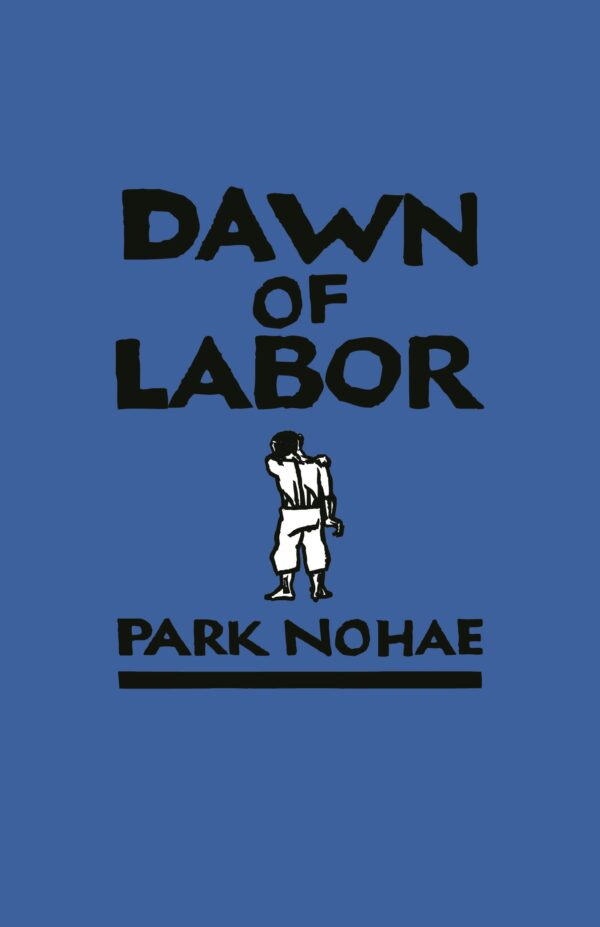
Dawn of Labor
Park Nohae
Translated by Brother Anthony of Taizé and Cheehyung Harrison Kim
March 2024
278 pages
ISBN: 9780824894047
Hardback: $74.00
Park Nohae is South Korea’s most acclaimed activist poet. Dawn of Labor, his first poetry collection, was published in 1984.
Brother Anthony of Taizé, who also goes by his Korean name An Sonjae, is a literature scholar and translator and is professor emeritus of English language and literature at Sogang University in Seoul.
Cheehyung Harrison Kim is associate professor of Korean history at the University of Hawai‘i at Mānoa.
Dawn of Labor, at last translated into English, is the legendary South Korean poet Park Nohae’s first collection, published in 1984 when he was twenty-seven years old. Despite a government ban, the book sold a million copies and propelled Park Nohae as the generation’s leading resistance poet. Dawn of Labor is an enduring classic that shook a society, transformed lives, and demonstrated the power of poetry.

Moral Authoritarianism: Neighborhood Associations in the Three Koreas, 1931–1972
Shinyoung Kwon
November 2023
392 pages
ISBN: 9780824895105
Hardback: $68.00
Shinyoung Kwon received a PhD in history from the University of Chicago and did postdoctoral research at the University of Cambridge.
Moral Authoritarianism offers a new perspective on the three modern Korean states—the Japanese colonial state, South Korea, and North Korea—by studying neighborhood associations during the four war decades (1930s–1960s). The existing historiography perceives the three states in relation to imperialism and to the Cold War, thus emphasizing their differences by political changes. By shifting the focus from national policy to local society, this book instead reveals their deep similarities. Neighborhood associations dated back to the premodern Chosŏn period (1392–1910), when they were used to assist local governance. They faded in significance until the colonial government established “patriotic neighborhood associations” in 1938 for its war against China. Through analysis of government documents from the three Koreas and additional sources that include diaries, leaflets, newspapers, and even fiction, Moral Authoritarianism explores neighborhood associations as a site of negotiation between families, local society, and the central government; exposing the moral authoritarian structure present in all three Koreas.
Colonial neighborhood associations, tasked with the national mobilization of local Koreans, advanced programs of mass enlightenment that privileged state interests over individual rights, in the process blurring the line between morality and state authority and superimposing patriarchal familial dynamics on societal relations. Despite their different ideological orientations, the neighborhood associations of two postliberation Koreas shared the same enlightenment mission with their earlier forms, and this commonality is critical to understanding the authoritarian direction taken by South and North Korea. The neighborhood association entrusted each state with promoting community-based morality and spirit of voluntarism as an alternative to amoral laissez-faire capitalism and the individual right-based West. Consequently, the state retained its supremacy over the populace at the most basic level of community organization, and Koreans were encouraged to respond to state calls, culminating into two authoritarianisms of the 1970s—Korean style democracy and “our own style” socialism.

The Red Decades: Communism as Movement and Culture in Korea, 1919–1945
Vladimir Tikhonov
October 2023
420 pages
ISBN: 9780824893576
Hardback: $68.00
Vladimir Tikhonov is professor of Korean and East Asian studies in the Department of Culture Studies and Oriental Languages, Oslo University, Norway.
Focusing on previously neglected cultural expressions of colonial-period Korean socialism such as Marxist philosophy, Marxist historiography, and travelogues by socialist writers, The Red Decades reveals Marxian socialism as a cultural phenomenon of colonial-age Korea. Providing an account of the social composition of the Communist milieu in 1920s and 1930s Korea and outlining the aims of the colonial-period Communist movement as formulated in programmic documents, this text offers a rich, nuanced description of the microcosm of Korean Communism—a setting of factional alignments, pilgrimages to Moscow, extended stays of the Korean revolutionaries as exiles in China and the Soviet Union, and a polylingual environment with Chinese, Japanese, English, and Russian being equally important as the idioms of socialist propagation and international networking. Placing the endeavors of colonial-age Communists within a global historical context allows for dissections of how Korean socialists' ideals interacted with the realities of the conservative turn taking place in the Soviet Union since the late 1920s, as well as considering the implication of Stalinism for Korean revolutionary culture. Yet this analysis also focuses on the individuals involved, especially on their persistent issue of factionalism in the Korean Communist movement and on the role of underground radicalism in shaping the subaltern subjectivities of the participants.
The Red Decades discusses the world-historical place of “alternative modernity” that colonial-age socialists of Korea were pursuing. Based on a wealth of Japanese, Korean, Russian, and Chinese primary sources, including the Korea-related parts of the archives of Comintern, an under-utilized resource in Anglophone scholarship. The research also accommodates the achievements of the last decades, from South Korean, Japanese, Chinese, Anglophone and Russophone academic worlds. The breadth of this study situates the philosophical, historiographical, and political practices of Marxism of colonial Korea in the global historical perspective and simultaneously explores the long-lasting influences of the Communist movement in post-1945 North and South Korea.
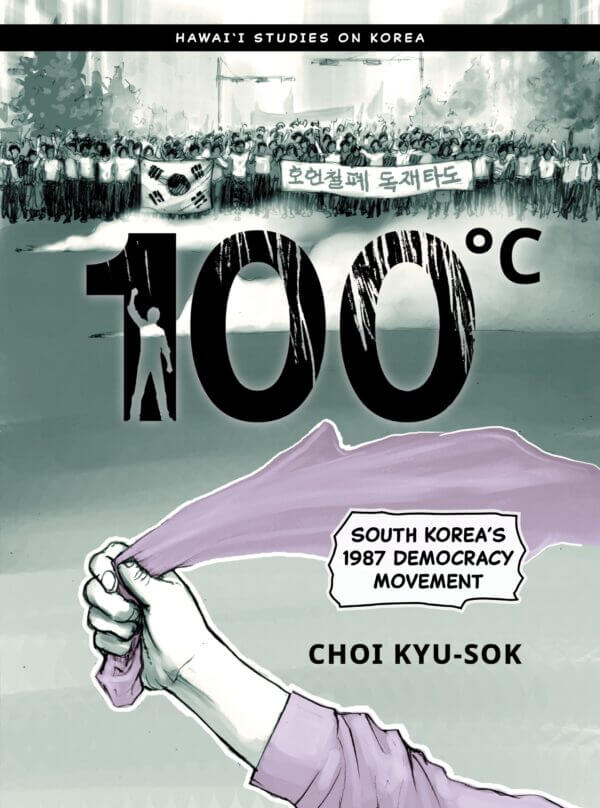
100°C: South Korea’s 1987 Democracy Movement
Choi Kyu-sok
Translated by Madeline D. Collins, Gia Kim, Nguyen Thi Huong Ly, Jusun Park, Brooke Shelton, Anna Toombs, and Theodore Jun Yoo
January 2023
192 pages
ISBN: 9780824893958
Paperback: $21.99
Choi Kyu-sok grew up in Changwon, South Korea, and graduated from Sangmyung University with a degree in cartoon and animation studies. He is the author of numerous prize-winning and celebrated alternative comics online and in print, including The Hellbound, written with director Yeon Sang-Ho and the basis for the 2021 Netflix series of the same name. Choi lives in Seoul, where he teaches animation.
What does it take for ordinary citizens to risk everything to protest living under a repressive government? What takes them beyond the brink, to the “boiling point”? In his graphic novel 100°C, celebrated webtoon and comics artist Choi Kyu-sok sheds a light on these questions by examining the lives of one family caught up in the great social unrest that developed under Chun Doo-hwan’s regime and culminated in the June 1987 Uprising. Crucial to understanding the events of the summer of 1987 is the recognition of both the political context and the dynamics of the nationwide effort that included students, office workers, and religious and labor groups—all of whom came together to demand a new constitution and free elections. Choi’s is a measured yet powerful representation of a pivotal moment in Korean history, when individuals questioned the status quo, when parents joined their children to express their grievances and agitate for democratic reforms, when an entire nation chose to move in a new direction.

Flower of Capitalism: South Korean Advertising at a Crossroads
Olga Fedorenko
July 2022
298 pages
ISBN: 9780824890346
Hardback: $68.00
Olga Fedorenko is associate professor of anthropology at Seoul National University.
An ethnography of advertising in postmillennial South Korea, Flower of Capitalism: South Korean Advertising at a Crossroads details contests over advertising freedoms and obligations among divergent vested interests while positing far-reaching questions about the social contract that governs advertising in late-capitalist societies. The term “flower of capitalism” is a clichéd metaphor for advertising in South Korea, bringing resolutely positive connotations, which downplay the commercial purposes of advertising and give prominence to its potential for public service. Historically, South Korean advertising was tasked to promote virtue with its messages, while allocation of advertising expenditures among the mass media was monitored and regulated to curb advertisers’ influence in the name of public interest. Though this ideal was often sacrificed to situational considerations, South Korean advertising had been remarkably accountable to public scrutiny and popular demands.
This beneficent role of advertising, however, came under attack as a neoliberal hegemony consolidated in South Korea in the twenty-first century. Flower of Capitalism examines the clash of advertising’s old obligations and new freedoms, as it was navigated by advertising practitioners, censors, audiences, and activists. It weaves together a rich multi-sited ethnography—at an advertising agency and at an advertising censorship board—with an in-depth exploration of advertising-related controversies—from provocative advertising campaigns to advertising boycotts. Advertising emerges as a contested social institution whose connections to business, mass media, and government are continuously tested and revised.
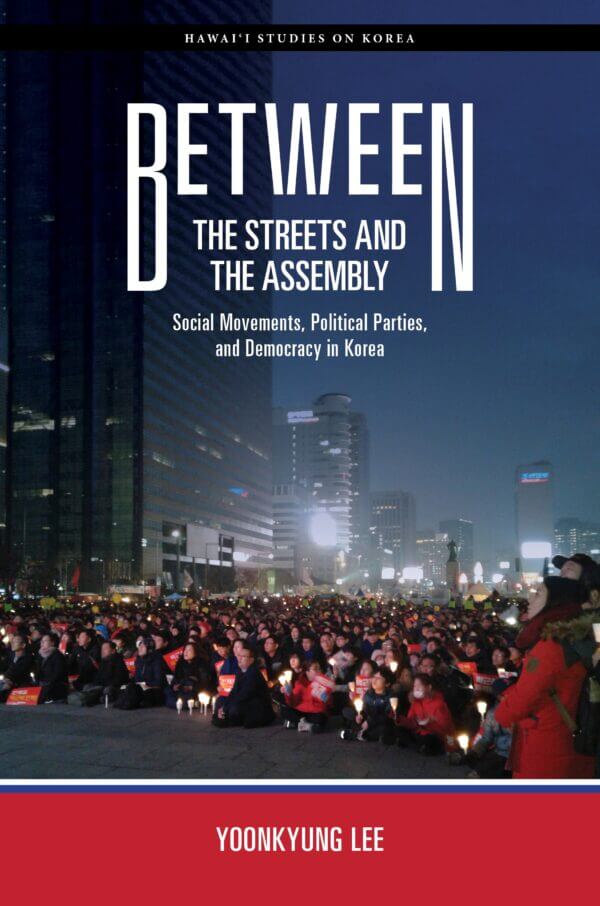
Between the Streets and the Assembly: Social Movements, Political Parties, and Democracy in Korea
Yoonkyung Lee
March 2022
244 pages
ISBN: 9780824890179
Hardback: $68.00
Yoonkyung Lee is professor in the Department of Sociology and Korea Foundation Chair of Korean Studies at the University of Toronto.
Streets in Korea rarely go quiet without first having a public demonstration and Korean citizens are known as seasoned protestors, charting the course of national politics. Between the Streets and the Assembly explores how protest movements have become the prominent mode of democratic politics in Korea, in contrast to political parties in the National Assembly that have lagged behind in partisan representation and accountability. To unpack this political dynamic, this book closely follows three groups of democracy activists who were born in their resistance to military dictatorships but who pursued different methods of democratic representation in postauthoritarian Korea (1987–2020). One group stayed in civil society and organized powerful protests outside formal institutions; another group chose to join existing parties with the aim of reforming legislative politics; and the third group was devoted to forming separate progressive parties to be the agent of transformative agenda. By analyzing the interactive evolution of these three modes of democratic representation, Yoonkyung Lee finds that social movement organizations have been more effective than activist-turned politicians in centrist or progressive parties in creating coordination infrastructures for collective action. Through the practice of organizing national solidarity networks, innovating the methods of mass street demonstrations, and drawing professional expertise to formulate policy alternatives, Korean civic groups have built the capacity to directly shape and alter the course of national politics, unlike activist-turned politicians who remained divided with no common political programs.
This study asserts that social movement organizations and political parties develop variable capacities for democratic representation, depending on coevolutionary interactions with each other. The experience of Korean democracy shows social movement groups can be a powerful agent of national politics against the scholarly assumption that views civic associations as narrowly focused, transient organizations. Between the Streets and the Assembly suggests a different possibility of political process, one in which civic groups and participatory citizens, not political parties, are the primary drivers of democratic politics.

Invented Traditions in North and South Korea
Edited by Andrew David Jackson, Codruța Sîntionean, Remco Breuker, and CedarBough Saeji
November 2021
426 pages
ISBN: 9780824890339
Hardback: $68.00
Andrew David Jackson is associate professor of Korean studies at Monash University, Melbourne, where he has worked since 2017. Previously, he taught Korean studies at the University of Copenhagen, Denmark.
Codruţa Sîntionean is assistant professor in the Department of Asian Languages and Literatures at Babeş-Bolyai University in Cluj-Napoca, Romania.
Remco E. Breuker is professor of Korean studies at Leiden University, the Netherlands.
CedarBough Saeji is assistant professor in Korean and East Asian Studies at Pusan National University.
Almost forty years after the publication of Hobsbawm and Ranger’s The Invention of Tradition, the subject of invented traditions—cultural and historical practices that claim a continuity with a distant past but which are in fact of relatively recent origin—is still relevant, important, and highly contentious. Invented Traditions in North and South Korea examines the ways in which compressed modernity, Cold War conflict, and ideological opposition has impacted the revival of traditional forms in both Koreas. The volume is divided thematically into sections covering: (1) history, religions, (2) language, (3) music, food, crafts, and finally, (4) space. It includes chapters on pseudo-histories, new religions, linguistic politeness, literary Chinese, p’ansori, heritage, North Korean food, architecture, and the invention of children’s pilgrimages in the DPRK.
As the first comparative study of invented traditions in North and South Korea, the book takes the reader on a journey through Korea’s epic twentieth century, examining the revival of culture in the context of colonialism, decolonization, national division, dictatorship, and modernization. The book investigates what it describes as “monumental” invented traditions formulated to maintain order, loyalty, and national identity during periods of political upheaval as well as cultural revivals less explicitly connected to political power. Invented Traditions in North and South Korea demonstrates that invented traditions can teach us a great deal about the twentieth-century political and cultural trajectories of the two Koreas. With contributions from historians, sociologists, folklorists, scholars of performance, and anthropologists, this volume will prove invaluable to Koreanists, as well as teachers and students of Korean and Asian studies undergraduate courses.
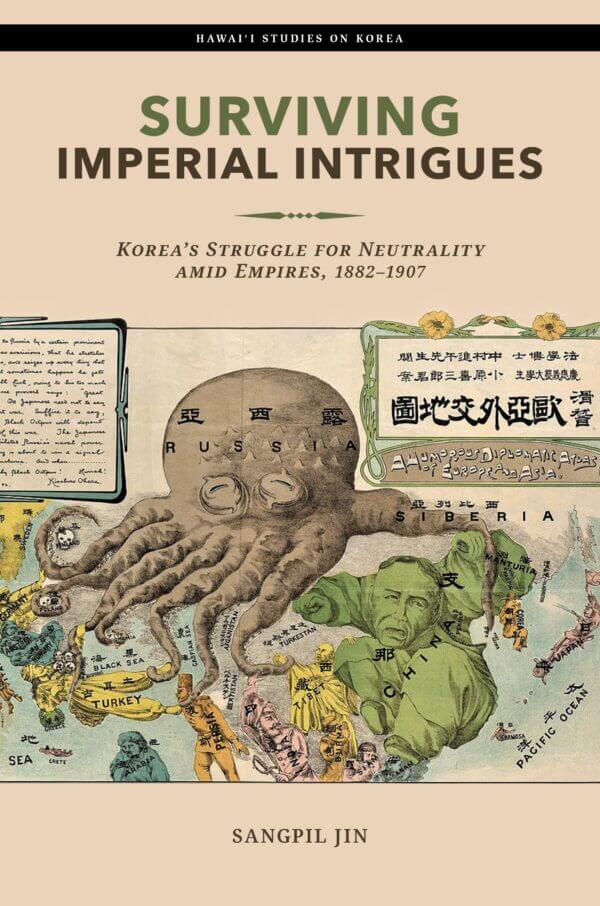
Surviving Imperial Intrigues: Korea’s Struggle for Neutrality amid Empires, 1882–1907
Sangpil Jin
July 2021
348 pages
ISBN: 9780824889050
Hardback: $68.00
Sangpil Jin specializes in modern Korean history, diplomatic history, imperial history, and East Asian geopolitics. He obtained a PhD in Korean studies at SOAS University of London, and his works have appeared in publications such as Acta Koreana, The International History Review, and The Diplomat.
In Surviving Imperial Intrigues, Sangpil Jin explores how successful Korean neutralization could have radically transformed the balance of power equation in East Asia. He conducted multilocational archival work, analyzing documents from the Austro-Hungarian Empire Ministry of Foreign Affairs, British Foreign Office, French Ministry of Foreign Affairs, German Foreign Office, Japanese Ministry of Foreign Affairs, Russian Foreign Office, Russian State Naval Archive, and US State Department, as well as perusing private papers and newspapers. What surfaced in these readings were disparate voices of multiple actors and their agendas concerning Korean neutrality and dynamic international relations in modern East Asia. Jin argues that although never implemented, Korean neutralization had the potential to succeed during the British occupation of Kŏmundo (1885–1887). He further points out that neutralization has recently resurfaced as a possible option for a unified Korean state to preserve its strategic flexibility amidst the US pivot to Asia and China’s re-emergence as a potential hegemon in the region.
While neutralization is the focal point of the book, Jin also analyzes Korea’s complex and layered relations with China, Japan, Russia, and the United States, within the overall framework of Sino-Japanese, Anglo-Russian, and Russo-Japanese rivalries. A periphery state in the contemporary international system, Korea was forced to navigate through intricate diplomatic relations with major imperial powers. Jin skillfully directs his academic lens toward understanding the stories behind Korea’s contentious relations and the rivalries among the powers. The timespan of his study stretching from 1882 to 1907 reflects his unique periodization that offers a groundbreaking view of Korean diplomatic history from a more regional geography paradigm. In recent years, contemporary South Korea has been learning to reassess its strategic position in the emerging Sino–US bipolarity in the Asia-Pacific region. This book serves as a historical guide for both specialists and policymakers who require a nuanced grasp of the new era of geopolitical shift, likely dominated by the two powers (China and the United States) that possess a distinct understanding of the norms and structure of the international order.

Divorce in South Korea: Doing Gender and the Dynamics of Relationship Breakdown
Yean-Ju Lee
January 2020
192 pages
ISBN: 9780824882556
Hardback: $80.00
Yean-Ju Lee is associate professor in sociology at the University of Hawai‘i at Mānoa.
It may sound logical that individualistic attitudes boost divorce. This book argues otherwise. Conservative norms of specialized gender roles serve as the root cause of marital dissolution. Those expectations that prescribe what men should do and what women should do help break down marital relationships. Data from South Korea suggest that lingering norms of gendered roles can threaten married persons’ self-identity and hence their marriages during the period of rapid structural changes.
The existing literature predicting divorce does not conceptually distinguish between the process of relationship breakdown and the act of ending a marriage, implicitly but heavily focusing on the latter while obscuring the former. In contemporary societies, however, the social and economic cost of divorce is sufficiently low—that is, stigma against divorce is minimal and economic survival after divorce is a nonissue—and leaving a marriage is no longer dictated by one’s being liberal or conservative or any particular characteristics. Thus, the right question to ask is not who leaves a marriage but why a marriage goes sour to begin with.
In Korea, a majority of divorces occur through mutual consent of the two spouses without any court procedure, but when one spouse files for divorce, the fault-based divorce litigation rules require the court to lay out the entire chronicle of relevant events occurring up to the legal action, often with the help of court investigators. As such, court rulings provide glimpses into the entire marital dynamics, including verbatim exchanges between the spouses. Lee argues that the typical process of relationship breakdown is related to married persons’ daily practices of verifying their gendered role identity.

Imperatives of Care: Women and Medicine in Colonial Korea
Sonja M. Kim
January 2019
240 pages
ISBN: 9780824855451
Hardback: $80.00
Sonja M. Kim is associate professor of Asian and Asian American studies at the State University of New York, Binghamton.
In late nineteenth- and early twentieth-century Korea, public health priorities in maternal and infant welfare privileged the new nation’s reproductive health and women’s responsibility for care work to produce novel organization of services in hospitals and practices in the home. The first monograph on this topic, Imperatives of Care places women and gender at the center of modern medical transformations in Korea. It outlines the professionalization of medicine, nursing, and midwifery, tracing their evolution from new legal and institutional infrastructures in public health and education, and investigates women’s experiences as health practitioners and patients, medical activities directed at women’s bodies, and the related knowledge and goods produced for and consumed by women. Sonja M. Kim draws on archival sources, some not previously explored, to foreground the ways individual women met challenges posed by uneven developments in medicine, intervened in practices aimed at them, andseized the evolving options that became available to promote their personal, familial, and professional interests. She demonstrates how medicine produced, and in turn was produced by, gendered expectations caught between the Korean reformist agenda, the American Protestant missionary enterprise, and Japanese imperialism.

Catholics and Anti-Catholicism in Chosŏn Korea
Don Baker with Franklin Rausch
May 2017
328 pages
ISBN: 9780824866266
Hardback: $80.00
Don Baker is professor of Korean civilization in the Department of Asian Studies at the University of British Columbia.
Franklin Rausch is assistant professor in the Department of History and Philosophy at Lander University in Greenwood, South Carolina.
Korea’s first significant encounter with the West occurred in the last quarter of the eighteenth century when a Korean Catholic community emerged on the peninsula. Decades of persecution followed, resulting in the deaths of thousands of Korean Catholics. Don Baker provides an invaluable analysis of late-Chosŏn (1392–1897) thought, politics, and society to help readers understand the response of Confucians to Catholicism and of Korean Catholics to years of violent harassment. His analysis is informed by two remarkable documents expertly translated with the assistance of Franklin Rausch and annotated here for the first time: an anti-Catholic essay written in the 1780s by Confucian scholar Ahn Chŏngbok (1712–1791) and a firsthand account of the 1801 anti-Catholic persecution by one of its last victims, the religious leader Hwang Sayŏng (1775–1801).
Confucian assumptions about Catholicism are revealed in Ahn’s essay, Conversation on Catholicism. The work is based on the scholar’s exchanges with his son-in-law, who joined the small group of Catholics in the 1780s. Ahn argues that Catholicism is immoral because it puts more importance on the salvation of one’s soul than on what is best for one’s family or community. Conspicuously absent from his Conversation is the reason behind the conversions of his son-in-law and a few other young Confucian intellectuals. Baker examines numerous Confucian texts of the time to argue that, in the late eighteenth century, Korean Confucians were tormented by a growing concern over human moral frailty. Some among them came to view Catholicism as a way to overcome their moral weakness, become virtuous, and, in the process, gain eternal life. These anxieties are echoed in Hwang’s Silk Letter, in which he details for the bishop in Beijing his persecution and the decade preceding it. He explains why Koreans joined (and some abandoned) the Catholic faith and their devotion to the new religion in the face of torture and execution. Together the two texts reveal much about not only Korean beliefs and values of two centuries ago, but also how Koreans viewed their country and their king as well as China and its culture.

Eastern Learning and the Heavenly Way: The Tonghak and Chondogyo Movements and the Twilight of Korean Independence
Carl Young
August 2014
296 pages
ISBN: 9780824838881
Hardback: $49.00
Carl F. Young is associate professor in the history department at the University of Western Ontario in London, Canada.
Tonghak, or Eastern Learning, was the first major new religion in modern Korean history. Founded in 1860, it combined aspects of a variety of Korean religious traditions. Because of its appeal to the poor and marginalized, it became best known for its prominent role in the largest peasant rebellion in Korean history in 1894, which set the stage for a wider regional conflict, the Sino-Japanese War of 1894–1895. Although the rebellion failed, it caused immense changes in Korean society and played a part in the war that ended in Japan's victory and its eventual rise as an imperial power.
It was in this context of social change and an increasingly perilous international situation that Tonghak rebuilt itself, emerging as Ch’ŏndogyo (Teaching of the Heavenly Way) in 1906. During the years before Japan’s annexation of Korea in 1910, Ch’ŏndogyo continued to evolve by engaging with new currents in social and political thought, strengthening its institutions, and using new communication technologies to spread its religious and political message. In spite of Korea’s loss of independence, Ch’ŏndogyo would endure and play a major role in Korean nationalist movements in the Japanese colonial period, most notably the March First independence demonstrations in 1919. It was only able to thrive thanks to the processes that had taken place in the twilight years of Korean independence.
This book focuses on the internal developments in the Tonghak and Ch’ŏndogyo movements between 1895 and 1910. Drawing on a variety of sources in several languages such as religious histories, doctrinal works, newspapers, government reports, and foreign diplomatic reports, it explains how Tonghak survived the turmoil following the failed 1894 rebellion to set the foundations for Ch’ŏndogyo’s important role in the Japanese colonial period. The story of Tonghak and Ch’ŏndogyo not only is an example of how new religions interact with their surrounding societies and how they consolidate and institutionalize themselves as they become more established; it also reveals the processes by which Koreans coped and engaged with the challenges of social, political, and economic change and the looming darkness that would result in the extinguishing of national independence at the hands of Japan’s expanding empire.
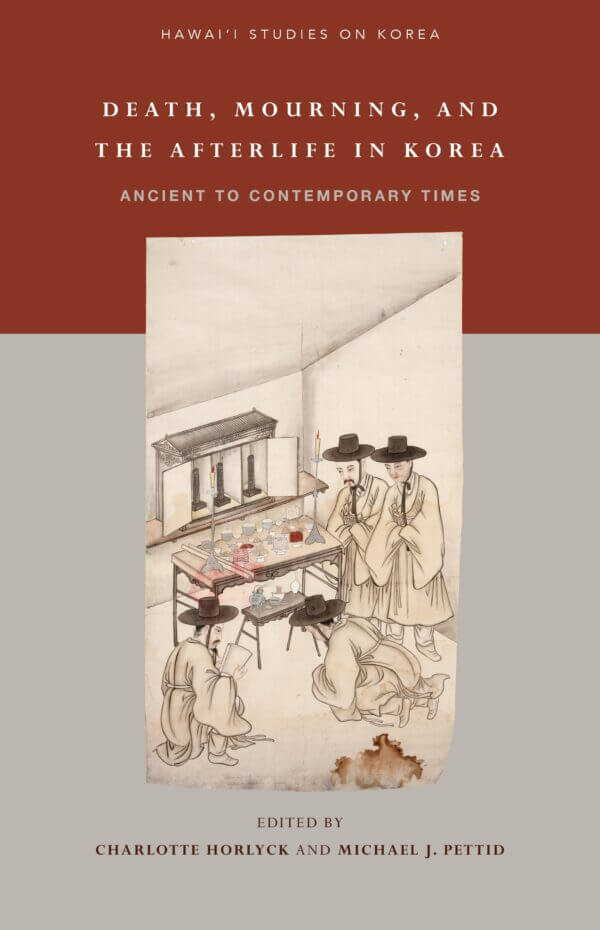
Death, Mourning, and the Afterlife in Korea: Ancient to Contemporary Times
Edited by Charlotte Horlyck and Michael J. Pettid
May 2014
280 pages
ISBN: 9780824839680
Hardback: $70.00
Charlotte Horlyck is lecturer in Korean art history in the Department of the History of Art and Archaeology, School of Oriental and African Studies, University of London.
Michael J. Pettid is professor of premodern Korean studies in the Department of Asian and Asian American Studies at Binghamton University (SUNY), where he also is director of the Translation Research and Instruction Program.
Death and the activities and beliefs surrounding it can teach us much about the ideals and cultures of the living. While biologically death is an end to physical life, this break is not quite so apparent in its mental and spiritual aspects. Indeed, the influence of the dead over the living is sometimes much greater than before death. This volume takes a multidisciplinary approach in an effort to provide a fuller understanding of both historic and contemporary practices linked with death in Korea.
Contributors from Korea and the West incorporate the approaches of archaeology, history, literature, religion, and anthropology in addressing a number of topics organized around issues of the body, disposal of remains, ancestor worship and rites, and the afterlife. The first two chapters explore the ways in which bodies of the dying and the dead were dealt with from the Greater Silla Kingdom (668–935) to the mid-twentieth century. Grave construction and goods, cemeteries, and memorial monuments in the Koryŏ (918–1392) and the twentieth century are then discussed, followed by a consideration of ancestral rites and worship, which have formed an inseparable part of Korean mortuary customs since premodern times. Chapters address the need to appease the dead both in shamanic and Confucians contexts. The final section of the book examines the treatment of the dead and how the state of death has been perceived. Ghost stories provide important insight into how death was interpreted by common people in the Koryŏ and Chosŏn (1392–1910) while nonconformist narratives of death such as the seventeenth-century romantic novel Kuunmong point to a clear conflict between Buddhist thought and practice and official Neo-Confucian doctrine. Keeping with unendorsed views on death, the final chapter explores how death and the afterlife were understood by early Korean Catholics of the eighteenth and nineteenth centuries.
Death, Mourning, and the Afterlife in Korea fills a significant gap in studies on Korean society and culture as well as on East Asian mortuary practices. By approaching its topic from a variety of disciplines and extending its historical reach to cover both premodern and modern Korea, it is an important resource for scholars and students in a variety of fields.
Confucian assumptions about Catholicism are revealed in Ahn’s essay, Conversation on Catholicism. The work is based on the scholar’s exchanges with his son-in-law, who joined the small group of Catholics in the 1780s. Ahn argues that Catholicism is immoral because it puts more importance on the salvation of one’s soul than on what is best for one’s family or community. Conspicuously absent from his Conversation is the reason behind the conversions of his son-in-law and a few other young Confucian intellectuals. Baker examines numerous Confucian texts of the time to argue that, in the late eighteenth century, Korean Confucians were tormented by a growing concern over human moral frailty. Some among them came to view Catholicism as a way to overcome their moral weakness, become virtuous, and, in the process, gain eternal life. These anxieties are echoed in Hwang’s Silk Letter, in which he details for the bishop in Beijing his persecution and the decade preceding it. He explains why Koreans joined (and some abandoned) the Catholic faith and their devotion to the new religion in the face of torture and execution. Together the two texts reveal much about not only Korean beliefs and values of two centuries ago, but also how Koreans viewed their country and their king as well as China and its culture.

Non-Traditional Security Issues in North Korea
Edited by Kyung-Ae Park
July 2013
248 pages
ISBN: 9780824837396
Hardback: $54.00
Kyung-Ae Park holds the Korea Foundation Chair at the Institute of Asian Research, University of British Columbia.
The concept of security has undergone significant change in the past few decades. Traditionally thought of in terms of the state-centric, militarily focused, realist discourse, the concept of security has been broadened to include a greater number of potential threats and an increased number of relevant actors. Yet, despite the great changes in security scholarship, the vast majority of studies on North Korea continue to focus primarily on the country’s nuclear weapons program, its military, and other traditional security issues surrounding Pyongyang. While North Korea captures headlines with its aggressive behavior and growing nuclear arsenal, the ground-level threats to average, everyday North Koreans go largely unnoticed. This groundbreaking volume seeks to refocus research on North Korean security from the traditional to largely unexplored non-traditional security (NTS) issues.
In the wake of political succession to Kim Jung Un, the issue of non-traditional security is increasingly important. From the lasting effects of the famine of the 1990s to continued food shortages and the growing marketization of North Korean society, the Pyongyang regime is facing diverse and unprecedented challenges. This book offers cutting-edge analyses of emerging North Korean NTS issues by the world’s leading specialists in the field. It looks at these issues and their effects at the local, regional, and international level, as well as examining the international community’s efforts to promote an NTS approach to North Korea. More specifically, the volume addresses the traditional and non-traditional security paradigms, energy security, gender security, transnational organized crime, the internal and external dimensions of North Korea’s food security, the “Responsibility to Protect,” refugee issues and international law, and the role of NGOs in promoting NTS in North Korea.
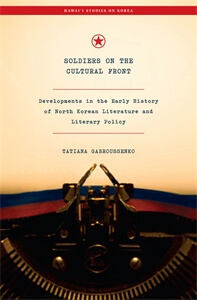
Soldiers on the Cultural Front: Developments in the Early History of North Korean Literature and Literary Policy
Tatiana Gabroussenko
July 2010
248 pages
ISBN: 9780824833961
Hardback: $49.00
Tatiana Gabroussenko is a visiting fellow in the Faculty of Asian Studies at Australia National University.
An understanding of contemporary North Korea’s literature is virtually impossible without an investigation of its formative period, 1945–1960, which saw a gradual transformation from the initial “Soviet era” to a Korean version of “national Stalinism.” This turbulent epoch established a long-lasting framework for North Korean literature and set up an elaborate system of political control over literary matters, as well as over the people who served in this field.
In 1946 Democratic People’s Republic of Korea (DPRK) leader Kim Il Sung described the country’s writers as “soldiers on the cultural front,” thus clearly defining what the nascent Communist regime expected from its intellectuals. As a result, many literary nonentities were rewarded with fame and success (often only to be relegated once again to obscurity within a few years) while many outstanding luminaries of the past were erased from the pages of official publications or even lost their lives. The Soviet cultural impact brought new tropes, artistic images, and rhetoric, which were quickly absorbed into the North Korean discourse. However, the cultural politics of the DPRK and the USSR revealed profound and irreconcilable disparities that were rooted in the different political conditions and traditions of each country.
Soldiers on the Cultural Front presents the first consistent research on the early history of North Korea’s literature and literary policy in Western scholarship. It traces the introduction and development of Soviet-organized conventions in North Korean literary propaganda and investigates why the “romance with Moscow” was destined to be short lived. It reconstructs the biographies and worldviews of major personalities who shaped North Korean literature and teases these historical figures out of popular scholarly myth and misconception. The book also investigates the specific forms of control over intellectuals and literary matters in North Korea. Considering the unique phenomenon of North Korean literary critique, the author analyzes the political campaigns and purges of 1947–1960 and investigates the role of North Korean critics as “political executioners” in these events. She draws on an impressive variety and number of sources—ranging from interviews with Korean and Soviet participants, public and family archives, and memoirs to original literary and critical texts—to present a balanced and eye-opening work that will benefit those interested in not only understanding North Korean literature and society, but also rethinking forms of socialist modernity elsewhere in the world.

Koreo-Japonica: A Re-evaluation of a Common Genetic Origin
Alexander Vovin
November 2009
296 pages
ISBN: 9780824832780
Hardback: $55.00
Alexander Vovin is professor of East Asian languages at the University of Hawai‘i at Mānoa.
The Japonic (Japanese and Ryukyuan) portmanteau language family and the Korean language have long been considered isolates on the fringe of northeast Asia. Although in the last fifty years many specialists in Japonic and Korean historical linguistics have voiced their support for a genetic relationship between the two, this concept has not been endorsed by general historical linguists and no significant attempts have been made to advance beyond the status quo. Alexander Vovin, a longtime advocate of the genetic relationship view, engaged in a reanalysis of the known data in the hope of finding evidence in support of this position. In the process of his work, however, he became convinced that the multiple similarities between Japonic and Korean are the result of several centuries of contact and do not descend from a hypothetical common ancestor.
In Koreo-Japonica, Vovin carefully reviews recent advances in the reconstruction of both language families. His detailed analysis of most of the morphological and lexical comparisons offered so far shows that whenever the proposed comparisons are not due to pure chance, they can almost always be explained as borrowings from Korean into a central group of Japanese dialects from roughly between the third and eighth centuries A.D. The remaining group of lexical (but not morphological) comparisons that cannot be explained in this way is, he argues, too small to serve as proof of even a distant genetic relationship.
In this volume, a leading historical linguist presents a significant challenge to a view widely held by Japonic and Korean historical linguistics on the relationship between the two language families and offers material support for the skepticism long espoused by general historical linguists on the matter. His findings will both challenge and illuminate issues of interest to all linguists working with language contact and typology as well as those concerned with the prehistory and early history of East Asia.
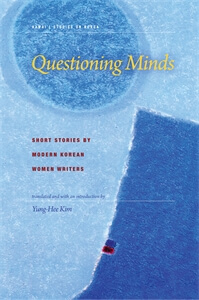
Questioning Minds: Short Stories by Modern Korean Women Writers
Yung-Hee Kim
October 2009
256 pages
ISBN: 9780824833954
Hardback: $55.00
Yung-Hee Kim is Professor of Korean literature in the Department of East Asian Languages and Literatures, University of Hawai‘i at Mānoa. Her publications include Questioning Minds: Short Stories by Modern Korean Women Writers and Readings in Modern Korean Literature (co-authored).
Available for the first time in English, the ten short stories by modern Korean women collected here touch in one way or another on issues related to gender and kinship politics. All of the protagonists are women who face personal crises or defining moments in their lives as gender-marked beings in a Confucian, patriarchal Korean society. Their personal dreams and values have been compromised by gender expectations or their own illusions about female existence. They are compelled to ask themselves “Who am I?” “Where am I going?” “What are my choices?” Each story bears colorful and compelling testimony to the life of the heroine. Some of the stories celebrate the central character’s breakaway from the patriarchal order; others expose sexual inequality and highlight the struggle for personal autonomy and dignity. Still others reveal the abrupt awakening to mid-life crises and the seasoned wisdom that comes with accepting the limits of old age.
The stories are arranged in chronological order, from the earliest work by Korea’s first modern woman writer in 1917 to stories that appeared in 1995—approximately one from each decade. Most of the writers presented are recognized literary figures, but some are lesser-known voices. The introduction presents a historical overview of traditions of modern Korean women’s fiction, situating the selected writers and their stories in the larger context of Korean literature. Each story is accompanied by a biographical note on the author and a brief critical analysis. A selected bibliography is provided for further reading and research.

Sitings: Critical Approaches to Korean Geography
Edited by Timothy R. Tangherlini and Sallie Yea
December 2007
248 pages
ISBN: 9780824831387
Hardback: $60.00
Timothy R. Tangherlini is a professor in the Department of Asian Languages and Cultures at the University of California, Los Angeles.
Sallie Yea is a senior research fellow in international development at RMIT University, Melbourne.
Arranged around a set of provocative themes, the essays in this volume engage in the discussion from various critical perspectives on Korean geography. Part One, “Geographies of the (Colonial) City,” focuses on Seoul during the Japanese colonial occupation from 1910–1945 and the lasting impact of that period on the construction of specific places in Seoul. In Part Two, “Geographies of the (Imagined) Village,” the authors delve into the implications for the conceptions of the village of recent economic and industrial development. In this context, they examine both constructed space, such as the Korean Folk Village, and rural villages that were physically transformed through the processes of rapid modernization. The essays in “Geographies of Religion” (Part Three) reveal how religious sites are historically and environmentally contested as well as the high degree of mobility exhibited by sites themselves. Similarly, places that exist at the margins are powerful loci for the negotiation of identity and aspects of cultural ideology. The final section, “Geographies of the Margin,” focuses on places that exist at the margins of Korean society.
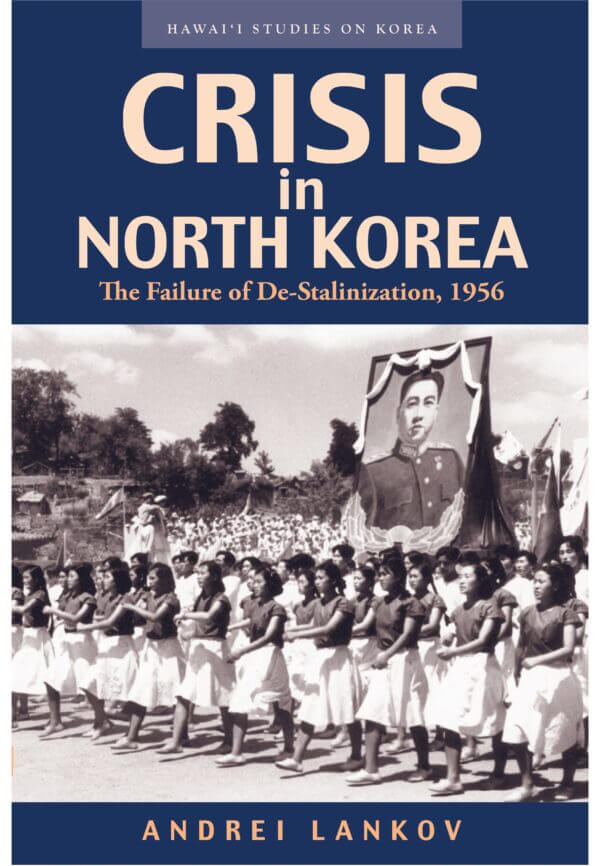
Crisis in North Korea: The Failure of De-Stalinization, 1956
Andrei Lankov
May 2007
296 pages
ISBN: 9780824832070
Paperback: $23.00
Andrei N. Lankov is a lecturer in the Faculty of Asian Studies, Australian National University.
North Korea remains the most mysterious of all Communist countries. The acute shortage of available sources has made it a difficult subject of scholarship. Through his access to Soviet archival material made available only a decade ago, contemporary North Korean press accounts, and personal interviews, Andrei Lankov presents for the first time a detailed look at one of the turning points in North Korean history: the country’s unsuccessful attempts to de-Stalinize in the mid-1950s. He demonstrates that, contrary to common perception, North Korea was not a realm of undisturbed Stalinism; Kim Il Sung had to deal with a reformist opposition that was weak but present nevertheless.
Lankov traces the impact of Soviet reforms on North Korea, placing them in the context of contemporaneous political crises in Poland and Hungary. He documents the dissent among various social groups (intellectuals, students, party cadres) and their attempts to oust Kim in the unsuccessful “August plot” of 1956. His reconstruction of the Peng-Mikoyan visit of that year—the most dramatic Sino-Soviet intervention into Pyongyang politics—shows how it helped bring an end to purges of the opposition. The purges, however, resumed in less than a year as Kim skillfully began to distance himself from both Moscow and Beijing. The final chapters of this fascinating and revealing study deal with events of the late 1950s that eventually led to Kim’s version of “national Stalinism.” Lankov unearths data that, for the first time, allows us to estimate the scale and character of North Korea’s Great Purge.
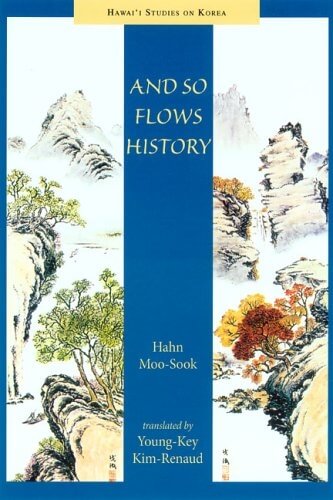
And So Flows History
Hahn Moo-Sook
Trans. by Young-Key Kim-Renaud
July 2005
298 pages
ISBN: 9780824828882
Hardback: $52.00
Young-Key Kim-Renaud is the eldest daughter of Hahn Moo-Sook. She is chair of the Department of East Asian Languages and Literatures and professor of Korean language and culture and international affairs at George Washington University, Washington, D.C.
A compelling saga of love, jealously, honor, and greed, And So Flows History (Yŏksanun hŭrŭnda, 1947) depicts the relentless power of exterior forces on the lives of three generations of the illustrious Cho family—from the waning years of the Chosŏn dynasty in the late nineteenth century to the tumultuous postliberation era.Hahn Moo-Sook (1918–1993) is one of Korea’s most celebrated writers of modern realist literature. She received many awards for her writing, including the 1986 Grand Prix of the Republic of Korea Literature Award for her novel Encounter. And So Flows History, Hahn’s first novel, received first prize in a 1947 contest organized by a major Korean daily. “[This] is the first modern Korean novel that defines, both in duration of its action and the issues it addresses, the trajectory of recent Korean history…. [Hahn Moo-Sook] devises a form, which can be characterized as a novel of ideas, in which each character is a symbolic figure, and which interweaves the lives of the Cho family with the social forces of the time. Enormously influential, it prefigures such themes as tradition versus modernization, the repositioning of gender, the redefinition and recomposition of class, the interaction between Koreas in Korea, and those in the diaspora that are taken up in later works.” —from the Introduction by JaHyun Kim Haboush
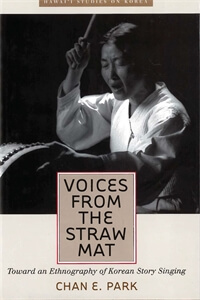
Voices from the Straw Mat: Toward an Ethnography of Korean Story Singing
Chan E. Park
February 2003
352 pages
ISBN: 9780824825119
Hardback: $51.00
Chan E. Park is associate professor of Korean language, literature, and performance folklore at Ohio State University.
From its humble “straw mat” origins to its paradoxical status as a national treasure, p'ansori has survived centuries of change and remains the primary source of Korean narrative and poetic consciousness. In this innovative work, Chan Park celebrates her subject not as a static phenomenon but a living, organic tradition adapting to an ever-shifting context. Drawing on her extensive literary and performance backgrounds, Park provides insights into the relationship between language and music, singing and speaking, and traditional and modern reception. Her “performance-centered” approach to p'ansori informs the discussion of a wide range of topics, including the amalgamation of the dramatic, the narrative, and the poetic; the invocation of traditional narrative in contemporary politics; the vocal construction of gender; and the politics of preservation.

Education Fever: Society, Politics, and the Pursuit of Schooling in South Korea
Michael J. Seth
September 2002
320 pages
ISBN: 9780824825348
Hardback: $52.00
Michael J. Seth is a professor of history at James Madison University in Harrisonburg, Virginia.
In the half century after 1945, South Korea went from an impoverished, largely rural nation ruled by a succession of authoritarian regimes to a prosperous, democratic industrial society. No less impressive was the country's transformation from a nation where a majority of the population had no formal education to one with some of the world's highest rates of literacy, high school graduates, and university students. Drawing on their premodern and colonial heritages as well as American education concepts, South Koreans have been largely successful in creating a schooling system that is comprehensive, uniform in standard, and universal. The key to understanding this educational transformation is South Korean society's striking, nearly universal preoccupation with schooling-what Korean's themselves call their “education fever.”
This volume explains how Koreans' concern for achieving as much formal education as possible appeared immediately before 1945 and quickly embraced every sector of society. Through interviews with teachers, officials, parents, and students and an examination of a wide range of written materials in both Korean and English, Michael Seth explores the reasons for this social demand for education and how it has shaped nearly every aspect of South Korean society. He also looks at the many problems of the Korean educational system: the focus on entrance examinations, which has tended to reduce education to test preparation; the overheated competition to enter prestige schools; the enormous financial burden placed on families for costly private tutoring; the inflexibility created by an emphasis on uniformity of standards; and the misuse of education by successive governments for political purposes.
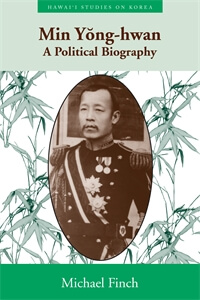
Min Yong-hwan: A Political Biography
Michael Finch
June 2002
272 pages
ISBN: 9780824825201
Hardback: $47.00
Michael Finch is visiting assistant professor of Korean studies at Keimyung University in Taegu.
The diplomat and scholar-official Min Yông-hwan (1861-1905), described by one contemporary Western observer as “undoubtably the first Korean after the emperor,” is best remembered in Korean historiography for his pioneering diplomacy at the courts of Tsar Nicholas II and Queen Victoria in the late 1890s. Furthermore, he is considered to be the foremost patriot of Korea's Taehan era (1897-1907). This pioneering study of Min Yông-hwan is long overdue and provides us with a new perspective on a period of Korean history that still casts its shadow over the region today.
This new biography of Min contributes substantially to our understanding of this period by looking beyond the established view of Korea as being polarized between reformists and reactionaries in the late Choson era. In doing so, it provides us with deeper insight into the full range of responses of the late Choson leadership to the dual challenges of internal stagnation and external intervention at the juncture of the nineteenth and twentieth centuries. It will be essential reading for anyone interested in the recent history of Korea, late nineteenth century imperialism, and Russian, Japanese, American, and British foreign policy in northeast Asia.

Laying Claim to the Memory of May: A Look Back at the 1980 Kwangju Uprising
Linda S. Lewis
April 2002
216 pages
ISBN: 9780824825430
Paperback: $23.00
Linda S. Lewis is associate professor of anthropology and director of the East Asian Studies Program at Wittenberg University.
The Kwangju Uprising–“Korea's Tiananmen”–is one of the most important political events in late twentieth-century Korean history. What began as a peaceful demonstration against the imposition of military rule in the southwestern city of Kwangju in May 1980 turned into a bloody people's revolt. In the two decades since, memories of the Kwangju Uprising have lived on, assuming symbolic importance in the Korean democracy movement, underlying the rise in anti-American sentiment in South Korea, and shaping the nation's transition to a civil society. Nonetheless it remains a contested event, the subject still of controversy, confusion, international debate, and competing claims.
As one of the few Western eyewitnesses to the Uprising, Linda Lewis is uniquely positioned to write about the event. In this innovative work on commemoration politics, social representation, and memory, Lewis draws on her fieldwork notes from May 1980, writings from the 1980s, and ethnographic research she conducted in the late 1990s on the memorialization of Kwangju and its relationship to changes in the national political culture. Throughout, the chronological organization of the text is crisscrossed with commentary that provocatively disrupts the narrative flow and engages the reader in the reflexive process of remembering Kwangju over two decades. Highly original in its method and approach, Laying Claim to the Memory of May situates this seminal event in a broad historical and scholarly context. The result is not only the definitive history of the Kwangju Uprising, but also a sweeping overview of Korean studies over the last few decades.

The Ilse: First-Generation Korean Immigrants in Hawaii, 1903-1973
Wayne Patterson
January 2000
376 pages
ISBN: 9780824822415
Paperback: $29.00
Wayne Patterson is professor of history at St. Norbert College in De Pere, Wisconsin.
On January 13, 1903, the first Korean immigrants arrived in Hawai'i. Numbering a little more than a hundred individuals, this group represented the initial wave of organized Korean immigration to Hawai'i. Over the next two and a half years, nearly 7,500 Koreans would make the long journey eastward across the Pacific. Most were single men contracted to augment (and, in many cases, to offset) the large numbers of existing Chinese and Japanese plantation workers.
Although much has been written about early Chinese and Japanese laborers in Hawai'i, until now no comprehensive work had been published on first-generation Korean immigrants, the ilse. Making extensive use of primary source material from Korea, Japan, the continental U.S., and Hawai'i, Wayne Patterson weaves a compelling social history of the Korean experience in Hawai'i from 1903 to 1973 as seen primarily through the eyes of the ilse. Japanese surveillance records, student journals, and U.S. intelligence reports–many of which were uncovered by the author–provide an “inner history” of the Korean community. Chapter topics include plantation labor, Christian mission work, the move from the plantation to the city, picture prides, relations with the Japanese government, interaction with other ethnic groups, intergenerational conflict, the World War II experience, and the postwar years.